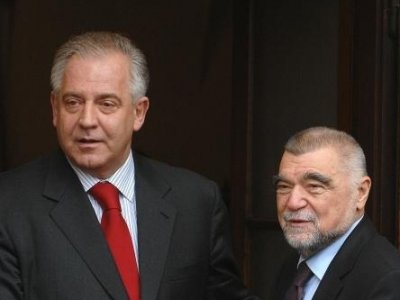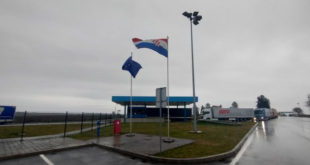 Analysts say the Croatian delay will drive another nail in the coffin of Balkan states` EU ambitions.
Analysts say the Croatian delay will drive another nail in the coffin of Balkan states` EU ambitions.
A border dispute with Slovenia will prolong Croatia’s European Union entry talks into 2010 and may undermine Zagreb’s resolve to enforce the toughest reforms that still lie ahead.
Analysts say the Croatian delay will drive another nail in the coffin of Balkan states’ EU ambitions, although most are already resigned to a long wait before joining the bloc.
“Chances to resolve the row with Slovenia and complete the talks this year are very slim,” said Vesna Pusic, head of parliament’s EU monitoring committee.
Political analyst Davor Gjenero said talks could last until the end of 2010. “In that case, there is a serious danger of losing motivation and replacing it with ‘why hurry?’.”
Croatia and Slovenia have accepted in principle EU mediation in their border dispute, which dates back to the 1991 break up of Yugoslavia and has prompted Slovenia to block one-third of Zagreb’s EU negotiations.
But the two countries remain entrenched in their positions with little room for a quick compromise. Croatia wants the mediation to lead to a court settlement, while Slovenia wants it to define the borders.
“There is national unity on the issue on both sides. I don’t see a chance for a breakthrough, a compromise, nor a wish to really do so,” said Zeljko Trkanjec, a Zagreb-based analyst.
Croatian Prime Minister Ivo Sanader, who has made EU membership his personal priority, indicated for the first time this week that Zagreb may not complete the talks this year, as planned.
“Speculation about dates is irrelevant. What matters is that we shall not be blackmailed, we shall not yield our territory in exchange for lifting the veto,” he told the parliament.
Slovenia, which joined the EU in 2004, wants direct access to international waters in the northern Adriatic, which would force Croatia to cede some waters it sees as its own.
INVESTOR WORRIES
A Zagreb-based EU diplomat said it was virtually impossible for Croatia to complete the talks this year even if the veto was lifted now. “There is so much work left on the judiciary, agriculture, which has been barely tackled.”
Financial analysts said it was paramount to stick to reforms rather than dates, to reassure investors and keep the country eligible for badly needed foreign loans.
“If the Slovenian veto led to a reform slowdown, and investors see that, our credit rating would be challenged,” said Zdeslav Santic of Raiffeisenbank.
Standard and Poor’s agency currently rates Croatia as BBB, with a negative outlook because of high public spending and foreign debt. By contrast Slovenia, already inside the European Union and the euro single currency, is rated AA.
But Hrvoje Stojic of Hypo Bank Alpe Adria said he did not see any immediate impact of a delay in EU talks on bonds or the kuna currency.
“Investors are more focused on what the government will do with the budget rebalance and how reforms will proceed, that will be the main indicator of Croatia’s credibility,” he said.
Vladimir Gligorov of the Vienna Institute for International Economic Studies said most previous EU candidates worked well only under pressure and against tight deadlines.
“I would not pin much hope on the government using the extra time to prepare better. I am afraid this will mean that reforms will be postponed. We’ve seen that in other countries”.
But he said Croatia’s delay would have little impact on the Balkans because “all the others there have already given up”, except Montenegro, which applied for EU membership in December.
Macedonia is an EU candidate but no date for talks has been set, while Albania and Bosnia have yet to apply.
Trkanjec said Serbia still stood a chance, if it arrests top war crimes suspect Ratko Mladic, indicted by the U.N. tribunal in The Hague. This would remove a veto imposed by the Netherlands.
“Failing that, there are no other real candidates. If Croatia is delayed, others are looking at even more delay. Which means Europe’s black hole will remain a black hole,” he said.
 Eurasia Press & News
Eurasia Press & News

